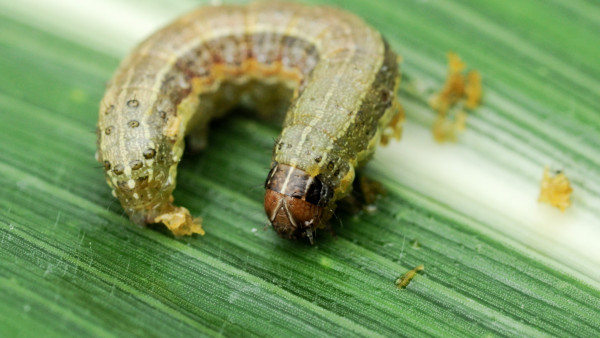Gisborne grower wages a war against fall armyworm
4 October 2022
There were pluses and minuses for a Gisborne vegetable grower who opted to turn in his cover crop after discovering a potentially devastating pest on his property.
Fall armyworm – so named because it can wipe out a crop overnight – was discovered in Tauranga in March of this year, and just a month later caterpillars were found in Waikato, Auckland, Taranaki, eastern Bay of Plenty and Gisborne.
The Gisborne grower spotted the potentially devastating pest “all over” his property – as well as on a couple of lease blocks.
His response was to ‘rework’ the affected paddocks to get rid of any vegetation that could provide a home and food source to the armyworm.
The upside of that approach, he said, was that removing the food source served to break the worm’s developmental cycle.
The downside was that removing the cover crop did away with the organic matter he planned to work into the soil to improve its health. That could also impact on his ability to meet his Farm Environment Plan requirements, but given the circumstances, he says he’s “hoping to get a pass on that.”
He's also hoping not to see the pest again but believes that is unlikely.
“We haven't seen it over winter but that's just because the weather doesn't suit what is a sub-tropical bug,” he says. “There's a chance that by November it could again be popping up around the district – perhaps due to reinvasion – so we're just going to have to keep an eye out.”
While the fall armyworm moth can feed on over 350 plant species, primary hosts include maize, potatoes, tomatoes, capsicum, aubergines and several species of brassica.
Its risk to New Zealand has been considered low as the pest in all its life stages – egg to adult – cannot hibernate over winter.
However, if established, it could do significant damage; so growers are urged to look out for eggs, larvae, pupae and moths – the latter being most active during late summer and early autumn.
The Ministry for Primary Industries (MPI) says useful pest management tools for growers who find fall armyworm (Spodoptera frugiperda) on their properties are crop rotation, crop monitoring, early detection and spraying.
Management options might also include:
- Cutting up volunteer plants and converting to silage or bailage;
- Spraying with insecticide;
- Herbicide spraying out volunteer crops, followed by tilling and crop rotation.
MPI says the circumstance of each grower is likely to be unique. Therefore, growers are advised to contact their industry representatives on the most appropriate way forward.
